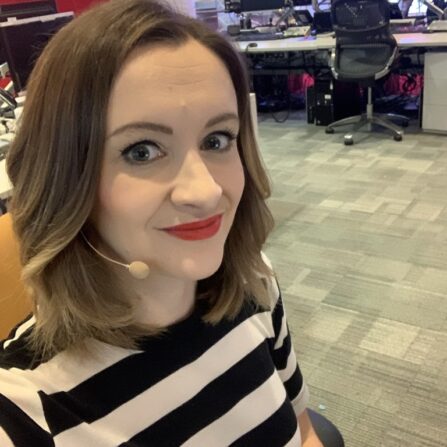
Jennifer B.
Senior Broadcast Journalist and Weather PresenterWhat led you to follow this career path?
I was always interested in working in the media, and as a student I had a real desire to be a radio presenter on a music programme. Over the years, my interest in journalism grew, and eventually I made the move into science journalism and specifically weather forecasting.
What qualification(s) or training did you complete?
My initial degree was in Modern European Languages, and I followed this with a Master’s in Radio Production and Management. That helped me get my foot in the door at the BBC – but once there, I received a lot of meteorological training from the Met Office to make sure that I understood and could communicate the science around weather to our viewers and listeners.
How are your qualification(s) or training useful in your everyday job?
My degree and MA were both vital, as they gave me a great foundation in learning how to communicate well, and this is one of the most important things when it comes to weather presenting. Of course, you need to be able to understand the science – and my on the job training helped with that enormously – but you must also be able to communicate that science to a broad range of viewers in a language that is easily understandable but also engaging and entertaining.
What does an average working day look like for you?
When I’m broadcasting, the first thing that I need to do is to get briefed on the current weather scenario – this means looking at different weather observations, synoptic charts and temperature maps to get an overview of the forecast and how it might have changed from the day before. This is then followed by a face to face or Zoom call with a head forecaster, which is a chance to ask questions before our broadcasts begin. It’s my job to create my own maps and graphics for TV, and this takes quite a while to prepare. Once that’s done, I do my own hair and make up and then usually do some radio forecasts before getting set up to do a live television weather forecast. There’s a lot that goes into a two minute TV forecast!
What aspect of your role do you most enjoy?
Live broadcasts are the most fun, especially when the weather is particularly interesting. I love the performance aspect of my job, but I also love the responsibility of communicating messages to our team if the weather is going to be significant or newsworthy. For example, I was working during Storm Desmond, one of the most significant rainfall events in recent UK history. At that time, there was a rare red warning issued, and it was part of my job to brief news teams around the country on the severity of the rainfall and flooding as it was happening.
What aspect of your job do you find most challenging?
Live TV is also the most challenging aspect of my job! Not many people realise that weather presenters do not have a script or autocue – everything that we say is ad libbed. This is because weather traditionally comes at the end of a news bulletin, and it’s our job to fill in the gaps with however much time is left, so you may not know whether you’re going to be talking for one and a half or three minutes until shortly before you’re live. That can be very tricky to deal with, but over the years I’ve learned how to cope with it and can waffle on for longer than I’ve planned to!
What would be your top piece of advice for anyone wanting to become a broadcast journalist and weather presenter?
Nowadays there are different routes to becoming a TV weather presenter. In the past, all TV presenters were trained meteorologists, in that they’d studied meteorology or atmospheric sciences or similar at uni. This is still an excellent path into it and can give you a solid foundation on which to start your career. However, it’s still possible to become a weather presenter if you’re following a different sort of degree, like I did – but you will still need to know your meteorology! There are many courses available online, some of which are completely free, and these can teach you the basics. If you’ve got a passion for weather and can see yourself doing this as a career, I’d urge everyone to practice. Film yourself presenting weather reports and get used to talking out loud – it’ll help enormously.




I am into anything to do with nature. I am a freelance textiles designer. I create drawings based on natural elememts and certain themes. I wanted a career to do with art and design. I thought it wouild be fun to give myself a new challenge. The weather being a natural thing has grown on me and I have signed up to do a meterology course online with the Centre of Excellence.